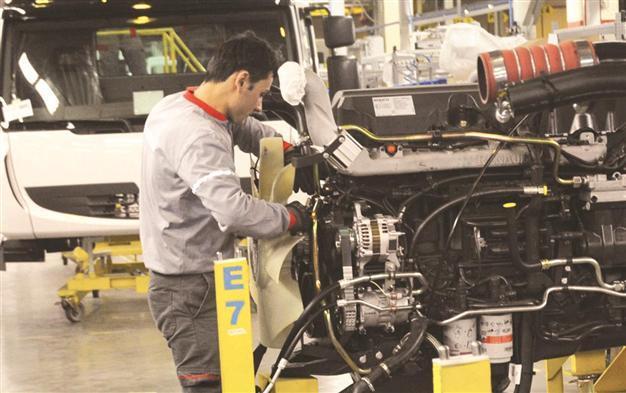Turkish auto makers to rely on exports amid troubles
ISTANBUL

The Turkish automotive sector raised its production last year mainly thanks to a growing
domestic market as well as more sales overseas, helped by the addition of new models, the Automotive Manufacturers Association (OSD) said. Daily News photo.
Turkish automotive manufacturers raised their output 5 percent to 1.13 million units last year thanks to soaring exports and a growing domestic market, the Automotive Manufacturers Association (OSD) has said, while adding that the sector would focus on the overseas market in 2014 amid expected troubles at home.
The sector, which is Turkey’s largest exporter, ramped up exports by 14 percent to 828,000 units by steering to alternative markets despite continuing weaknesses in the European market. Revenues from exports also soared by 12 percent to $21.5 billion in 2013.
“The export growth in spite of the contraction in Europe is significant,” OSD Chair Kudret Önen said during a meeting held to present the institution’s evaluation of 2013 and prospects for 2014. “This shows the industry is trying to cover the losses in Europe by entering new markets.”
Turkey’s vehicle industry, the country’s biggest source of exports, is Europe’s fifth-biggest, according to the OSD.
The domestic automotive sector representatives in Turkey have been depicting a dark picture for the sector in 2014, expressing worries over currency volatility and recently introduced government regulations and tax hikes.
Troubled year aheadThe weakening Turkish ira is already gradually raising prices, but sector representatives say the special consumption tax (ÖTV) hike introduced on vehicles at the beginning of the new year will sharpen that price raise in 2014.
The government hiked consumption tax on passenger cars by between 5 and 15 percent, depending on the size of the engine.
A regulation introduced to raise the down payment on car loans by the country’s banking watchdog, the BDDK, is also expected to add to sector players’ headaches.
The watchdog said curbing consumers’ use of credit cards to pay for goods such as cars with monthly installments will go into effect Feb. 1 as part of an effort to raise domestic savings rate and reduce the nation’s dependence on foreign capital to finance consumption.
However, the manufacturers are not that hopeless this year, as they are considering whether to balance domestic market losses by boosting export efforts.“I think the automotive industry will compensate for the production drop caused in the domestic market by focusing on exports in 2014,” Önen said during the meeting.
“The production is expected to be at around 1.1 to 1.2 million units. The goal for exports, meanwhile, is be between 810,000 and 850,000 units, with an expected value of $21 billion to $22 billion,” he said.
The Turkish automotive market sold 853,378 vehicles after a 9.72 percent rise, posting the second highest number of annual sales since 2011, the Automotive Distributors’ Association (ODD) said Jan. 7.
The ODD’s 2014 sales forecast currently stands at 800,000-860,000 vehicles this year, although the institution is expected to revise this number downwards in the wake of fresh problems in the sector.
The rise in capacity of some of the top manufacturers, Hyundai Assan, Ford Otosan and Toyota Turkey,
is also expected to bolster total production.
